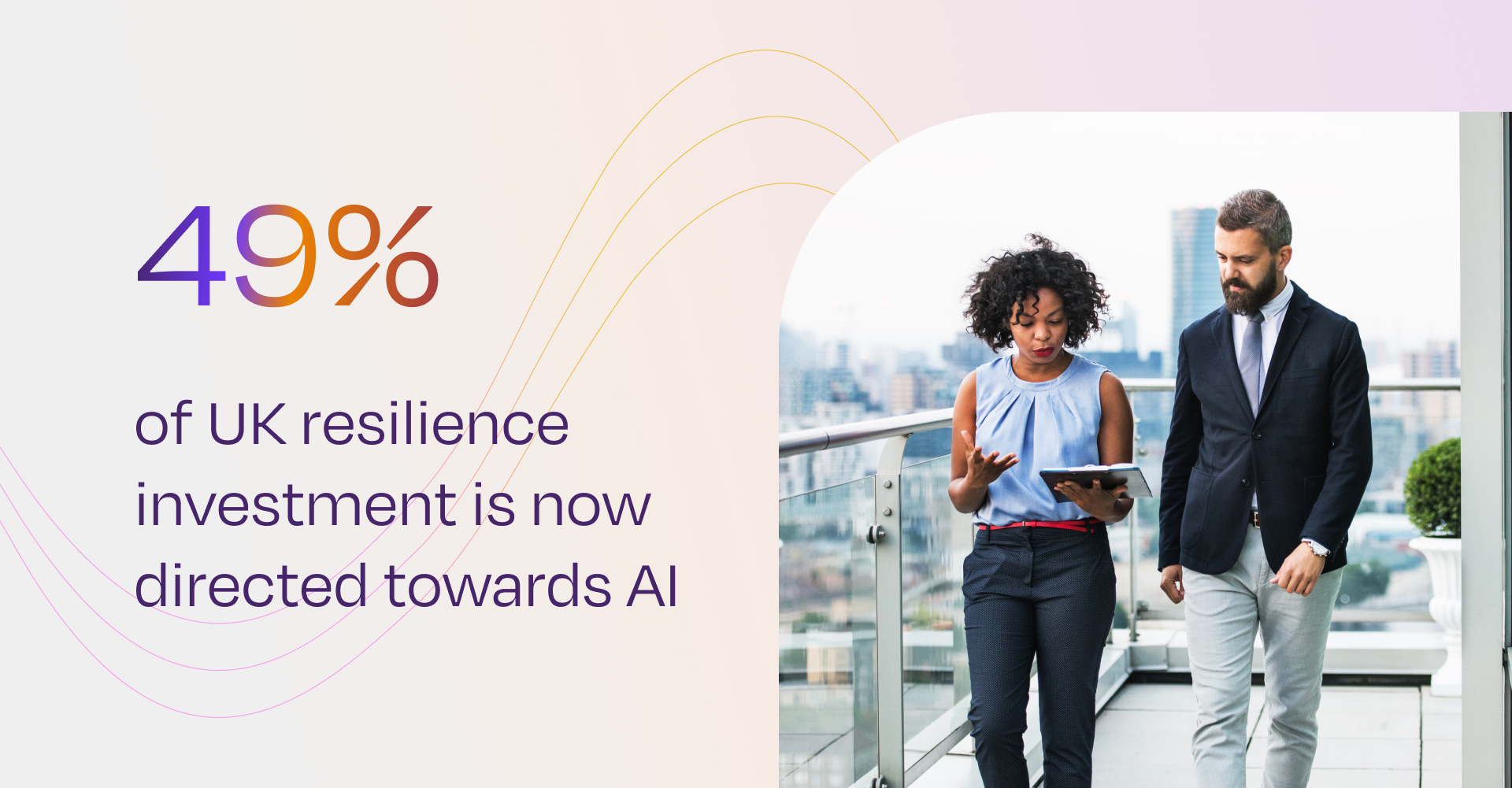Articles
Half of UK resilience budgets now go to AI as compliance pressures mount

AI moves from experiment to engine of resilience across UK organisations, new data reveals
Artificial intelligence (AI) is no longer a future prospect for British businesses, it’s now the first line of defence in an era of unrelenting regulatory scrutiny and operational uncertainty. Our latest research shows that 49% of all resilience-focused investment in UK organisations now flows to technology and AI.
This reallocation signals a fundamental change in how companies are safeguarding their operations, not just automating tasks, but deploying intelligent systems to anticipate disruption, accelerate decision-making and stay ahead of ever-tightening compliance demands.
AI as the immediate answer to rising demands
Facing pressure from regulators, an overwhelming 87% of UK business leaders say they are being forced to rethink operational resilience. The solution for them is AI, with more than triple what’s being spent on supply chain diversification (14%) or upskilling talent (13%) being invested into AI and technology. For a growing number of organisations, AI has moved far beyond experimentation and the focus is now on evolution. One in four businesses (25%) now treat agentic AI, systems that can execute on a goal and act autonomously, as a top strategic priority, and half are rapidly rolling out AI agents across multiple business functions, demonstrating that agentic AI has moved from a fringe experiment to mainstream business practice.
The research also spotlights sharp divides across sectors and business sizes. Science, technology and research firms are leading the AI charge, with over one third (36%) making agentic AI a high focus and 56% already expanding AI use across multiple business areas. In contrast, only 15% of retail businesses and 13% in education consider agentic AI a top priority. Larger enterprises are not only more likely to have dedicated or embedded AI teams, but also report higher rates of improved compliance, scalability and operational speed.
Fragmented ownership of the AI revolution
Despite AI’s dominance, its ownership within organisations remains fractured. While 37% of firms place AI within IT or engineering, others turn to Centres of Excellence (29%), hybrid models (28%), or data teams (27%), reflecting a lack of clear strategy and unified leadership. Three quarters (75%) of firms still lack a unified AI strategy, leaving them exposed and fragmented. This not only slows adoption, but also leaves organisations exposed to inconsistent governance and missed opportunities for cross-functional impact as AI’s role becomes increasingly business-critical.
Early wins and lingering doubts
Where AI has taken hold, the early adopters are already pulling ahead – 43% of leaders report faster decision-making, 39% see improved compliance, and over a third (38%) note cost savings, greater scalability (37%) and reduced operational risk (36%). However, the persistent fragmentation in AI ownership, combined with ongoing uncertainty around return on investment, means many organisations are still struggling to unlock AI’s full potential and establish a consistent, organisation-wide approach.
Adam Hofmann, Principal, Generative AI Strategy & Implementation at Elixirr commented: “AI has overtaken tradition as the backbone of resilience, yet too many firms remain stuck in a defensive mindset while others are rewriting the rules entirely. The organisations making real progress are those that go beyond surface-level adoption, embedding AI deep into their operations, reimagining outdated processes and building a culture that moves at the speed of technology. Playing it safe is now the biggest risk. AI is redrawing the boundaries of what’s possible faster than most organisations can adapt.
“Real resilience in the age of AI isn’t built through one-off tools or pilots, it’s built by rethinking how your business operates. When people, processes and technology are redesigned with AI at the core, organisations become more adaptable, more responsive and far better equipped to navigate the change ahead.”
Methodology
This online survey of 1000 UK business decision makers was commissioned by Clarity and conducted by market research company OnePoll, in accordance with the Market Research Society’s code of conduct. Data was collected between [06/09/2025] and [11/09/2025]. All participants are double-opted in to take part in research and are paid an amount depending on the length and complexity of the survey. This survey was overseen and edited by the OnePoll research team. OnePoll are MRS Company Partners, corporate membership of ESOMAR and Members of the British Polling Council.















